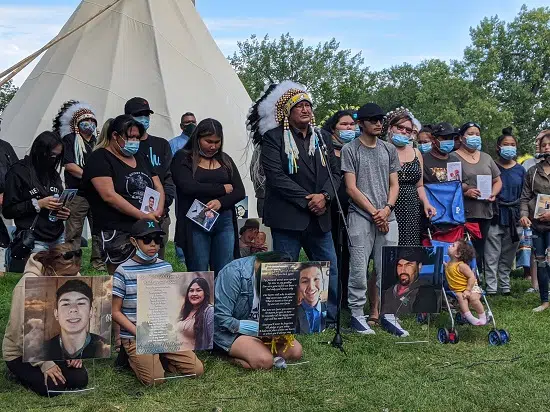The Walking With Our Angels site, adjacent from the Saskatchewan legislature in Regina’s Wascana Park, drew supporters from across the province on Tuesday to call for more from the provincial government in addressing suicide rates in Saskatchewan.
Tristen Durocher, who has been in Regina since July 31 after completing a walk from La Ronge to the provincial capital, is on day 11 of his hunger strike. He has only consumed tea and medicines in that time.
Durocher confirmed that he has no intentions of leaving the park until he completes his 44-day hunger strike on September 13, referencing the 44 MLAs from the Saskatchewan Party who voted down a suicide prevention bill introduced by the NDP earlier this summer. Although he hopes the government will adopt an improved suicide prevention strategy before then.
“Until then, I will be here and my music will play on,” suggested Durocher. “I sincerely hope there will come a day when I will play at more celebrations than grieving ceremonies because it is time.”

Fond du Lac Denesuline First Nation Chief Louie Mercredi is joined by families and friends of suicide victims from northern Saskatchewan when speaking to the audience on Tuesday, August 11, 2020. Blown up photos of those victims are one of the many placed in the ground surrounding the Walking With Our Angels camp in Regina’s Wascana Park. (Photo: Moises Canales/620 CKRM)
Among the people that joined Durocher and his camp on Tuesday included chiefs, representatives from Indigenous organizations and families of suicide victims. Fond du Lac Denesuline First Nation Chief Louie Mercredi was on hand for the event, admitting he has lost two brothers-in-law, a nephew and his daughter’s boyfriend to suicide.
When speaking to the audience, Mercredi said all levels of government say they want to help, however he feels there is no long-term solution for his people at this time.
“We don’t have the tools and we don’t have the funds to save our people,” he continued. “I have to remain strong to work for my people, for what we deserve as First Nation people of Saskatchewan and Canada.”
Mercredi pointed to a study in 2017 indicating that 60.1 per cent of suicides in Saskatchewan happen in the Athabasca Basin with 70 per cent being men and 30 per cent being women.
Another dignitary at the event was Assembly of First Nations Chief Perry Bellegarde. He said Durocher has provided hope to people that are wanting to see more done to address suicides in the province.
“There’s a call not only regionally here for legislation to deal with suicide properly, but you need to look at it nationally,” stated Bellegarde. “It affects all 634 First Nations, all of our people on-reserve, off-reserve and urban centres. It affects all peoples.”
Federation of Sovereign Indigenous Nations Chief Bobby Cameron said they intend on creating a bill to address suicide prevention with recommendations from Indigenous peoples.
Cameron said that following conversations with Durocher, chiefs, councils and band members, they determined that the province’s current suicide strategy will not work.
“It will not work for us because you don’t have direction and you don’t have recommendations from our people,” he added. “We’re going to work with folks like Tristen and many others who are affected, and hand them a bill based on our recommendations, traditions, protocols, languages and culture.”
“We will do what we can. We all love our children. We should all try to save them.”







